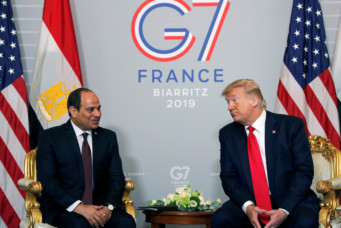The United States and Egypt: Constant Interests Require Consistent Policies
The United States and Egypt have long standing common interests requiring both to pursue consistent and sustained policies.

It has been thirty years since I had the privilege of representing the United States in Egypt. So much has changed.
Since the early 1990’s, Egypt and the Middle East have been radically transformed. New generations have been born; governments have been challenged or fallen; societies have been ripped apart; civil wars and insurrections plague much of the region and many economies of the Middle East have been shattered, unable to deliver basic needs to their citizens. The Arab world and its states have lost agency and at the same time outside powers have intruded directly or through proxies, fueling strife and instability.
When I arrived in Egypt in 1986, the United States played an outsized role in the affairs of the Middle East. Its ties to Israel, Egypt and Saudi Arabia gave it additional salience in the area’s affairs. In the years which followed, due to profound miscalculations, the United States chose to wage wars it could not win. As a result it lost influence on the streets of the Arab world and with governments, and outside powers realized they could challenge American authority. Even more seriously, our leaders lost the trust of the American public.
Furthermore, as a result of the success of this country’s hydrocarbons industry to provide for the energy needs of our economy, interest in the Middle East’s principle resource has waned. Other challenges to America’s position in the world, notably the rise of China, have made it clear to this country’s leaders and public that the weight of American attention and resources should shift to the East.
It would be a profound mistake, however, to allow a realignment of national priorities to obscure the fact that the United States has a deep and enduring stake in the Middle East and its stability. Our longstanding commitment to Israel’s security will not permit Americas leaders to be indifferent to conditions in the region. While we may depend less on the Middle East for oil and gas, the global economy relies heavily on the region’s energy supplies. The security of their flow is, therefore, deeply important to the United States.
Continuing Importance of the Middle East
At our peril, Americans would overlook the significance of the region’s conditions to our European allies. We depend heavily on them to maintain our position in the world and our prosperity. Terror flowing from radicalized conditions in the Middle East threatens Europe even more than it does our homeland and, as a result, containment and elimination of terror will remain a United States priority for years to come. Moreover, the flight of refugees from the region to Europe is a matter of the utmost political and social concern to our friends and allies in Europe. They expect our understanding and support.
Finally, Americans would be mistaken if we failed to recognize the importance of the global balance of power to the long-term interests of the United States. In a word, we need friends—nations prepared to work with us and stand up to pressures from those opposed to our democratic institutions and the preservation of peace. We must manage the imperatives of the shifting global strategic balance and the Middle East is a key arena where world power rivalries, including China’s rise, are playing out. We do not have to secure our place in the competition by military means, but the United States must be responsibly and patiently engaged, relying in the first instance on the tools of our diplomacy, our intelligence services and our economy.
In the years ahead, the United States will make its way in the world through the skillful building and management of coalitions. The Middle East is an area where coalitions will have to be a key feature of American policy. To survive in the highly competitive global environment, the United States must be able to develop partnerships and this brings me to the issue of Egypt and the relationship the United States should pursue with it.
Biden’s Opportunity
The advent of the Biden Administration provides an opportunity for Cairo and Washington to reflect on our interests and design policies which will permit us to navigate the crises of the Middle East. Since the 1973 war, the United States and Egypt have forged habits of coordination and cooperation which have served both countries well. There have been ups and downs in our relations. When I served as Ambassador to Egypt in the late 1980’s and early 1990’s, the relationship was respected in our two capitals. It encountered headwinds thereafter, none more severe than those which rose in the wake of the events in Tahir Square in 2011 and the Muslim Brotherhood’s assumption of power thereafter. Egypt and the United States talked past one another. Americans hoped to see Egypt set out on a road to democracy. Egyptians, on the other hand, believed that their culture of diversity and tolerance, as well as their country’s varied stability and survival were threatened by the Brotherhood’s behavior and policies.
In recent years, Cairo and Washington have achieved something of a modus vivendi but the arrangement rests on weak grounds. The Biden Administration will reach office critical of the practices of Egypt’s security establishment and concerned over the implications this might have for Egypt’s long term stability. These practices are seen to violate deeply held American principles as well as those of Egypt’s own citizens who wish to see their fellow countrymen treated justly and with respect. The concerns of many in the new administration echo views widely held on Capitol Hill, in the media, by America’s attentive public and by all those who know and care deeply for Egypt.
Before these concerns over human rights violations play an exclusive role in shaping our policies going forward, it is worth keeping in mind how dependent the United States is on Egypt and vice-a-versa. While largely disengaged from many issues of importance to the United States—the situations in Syria, Iraq and Yemen, the Iranian nuclear question and the cross Gulf tensions—Egypt, nonetheless remains the Arab world’s largest nation and a key center of cultural and religious authority. No Arab looks to the future of the region’s security and prosperity without taking Egypt into account. No other Arab platform—not Saudi Arabia, nor the UAE—offers the United States the same potential of partnership which Egypt does. We have developed over the decades strong habits of cooperation with Egypt’s military, intelligence services, diplomacy, government and business and academic communities. These ties matter in the design and execution of policy.
Americans would ignore what we have built with Egypt to our disadvantage. The road ahead in the region is long and we need to be engaged with Egypt to ensure other questions, including peace between it and Israel, remain strong. Egyptian cooperation is essential in dealing with the fractious situation in Gaza and progress over Palestine requires Egyptian participation. Furthermore, Egypt and the United States are involved in seeking a resolution to the Nile Waters dispute and Egypt has a consequential role to play in securing peace in Libya and establishing a stable government in Sudan. Egypt is a party to the seabed dispute in the Eastern Mediterranean. Beyond these immediate questions are prospects for cooperation in the Arab world, the United Nations and key international forums where Egypt has influence.
I believe that American policy must proceed from a careful and calm consideration of our national interests. The assessment cannot overlook our differences, especially on the important questions of human rights, the rule of law and essential political freedoms. Our differences are tough to manage; sensitivities run high. But I believe the importance and record of the relationship are such that we and Egypt have a responsibility to deal with our differences, while holding to our principles. We need to treat each other’s views with respect. The Egyptian government should keep in mind that the treatment of its fellow citizens has a profound impact on the way Egypt is seen by those whose friendship it seeks in Europe and beyond. Egypt’s reputation affects Egypt’s standing on the world stage.
Finally, Egypt should think carefully about how contribute to the relationship with the United States. It has a role to play in managing crises in the region and can help shape the Middle East in the post-Covid-19 economic recovery. Egypt has every reason to tackle the all-important question of climate change. In a word, the potential of partnership with the United States is significant.
Egypt has daunting challenges in the years ahead and needs sustained economic growth to provide for the wellbeing of its population. America can be a source of investment, trade and technology, provided Egypt’s policies are conducive. Population growth strains Egypt’s resources and addressing this challenge requires full-throated Egyptian commitment and international cooperation.
The time is right to rethink American economic and military assistance to Egypt as it was planned years ago on assumptions which no longer pertain. Challenges to Egypt and the United States require new approaches to our cooperation. We need to address and fund the war on terror, public health, the environment and economic recovery. The United States and Egypt have long standing common interests requiring both to pursue consistent and sustained policies.
Ambassador Wisner’s diplomatic career spans four decades and eight American presidents. He served as ambassador to Zambia, Egypt, the Philippines, and India during his extensive career in the State Department.
As Foreign Affairs Advisor, Ambassador Wisner plays a pivotal role at the firm, leveraging his vast experience in the Middle East, India, Europe and Asia to assist the firm’s domestic and international clients.
In addition to his role as ambassador to four countries, he has served as Under Secretary of Defense for Policy and as Under Secretary of State for International Security Affairs. Ambassador Wisner was senior Deputy Assistant Secretary for African Affairs from 1982 to 1986, a time of intense diplomatic engagement in Southern Africa.
After graduating from Princeton University in 1961, Ambassador Wisner joined the State Department as a Foreign Service officer. His first post was in Algiers immediately after it won independence from France. He then went to Vietnam, where he spent four years at the apex of the war.
Ambassador Wisner worked as a senior diplomat in Tunisia and Bangladesh before returning to Washington as Director of Plans and Management in the Bureau of Public Affairs. He joined the President’s Interagency Task Force on Indochina, the entity responsible for evacuating and settling nearly 1 million refugees and served as its Deputy Director.
Later, as Director of the Office of Southern African Affairs, Ambassador Wisner worked closely with Secretary of State Henry Kissinger to launch negotiations with Zimbabwe and Namibia.
Secretary of State Condoleezza Rice appointed Ambassador Wisner as the nation’s special representative to the Kosovo Status Talks in 2005 where he played a crucial role in negotiating Kosovo’s independence.
Before joining the firm, Ambassador Wisner served as Vice Chairman of External Affairs for American International Group.
He is a member of the Board of Directors of the Squire Patton Boggs Foundation, which promotes the role of public service and pro bono work in the practice of law and the development of public policy.
Read More


